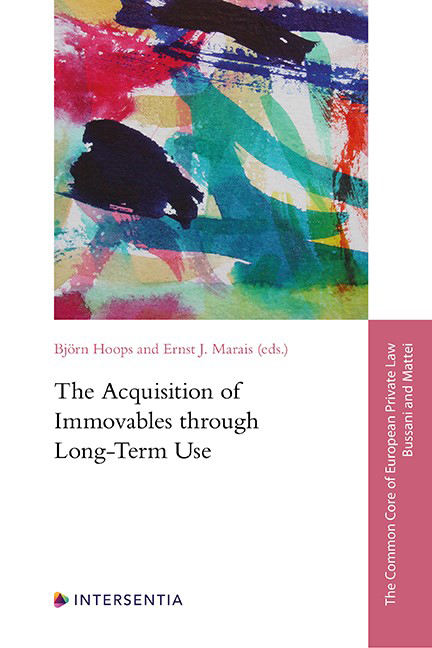Book contents
- Frontmatter
- General Editors’ Preface
- Preface
- Contents
- List of Cases
- Table of Legislation
- List of Abbreviations
- List of Contributors
- Case PART I INTRODUCTORY MATTERS
- PART II CASE STUDIES
- PART III GENERAL CONCLUSIONS
- Appendix I Instructions for the Project on the Acquisition of Immovables through Long-Term Use
- Index
The Final Search for the Common Core of Acquisitions of Immovables through Long-Term Use
Published online by Cambridge University Press: 26 May 2022
- Frontmatter
- General Editors’ Preface
- Preface
- Contents
- List of Cases
- Table of Legislation
- List of Abbreviations
- List of Contributors
- Case PART I INTRODUCTORY MATTERS
- PART II CASE STUDIES
- PART III GENERAL CONCLUSIONS
- Appendix I Instructions for the Project on the Acquisition of Immovables through Long-Term Use
- Index
Summary
THE SEARCH FOR A COMMON CORE
In Part II, the comparative analyses revealed the similarities and differences between the solutions and legal or doctrinal tools adopted by the examined jurisdictions to address the legal issues in each of the cases. These comparative analyses have shown that there is not one Common Core in terms of the solutions and tools that countries employ to address instances of long-term use of land. Instead, the diverse groups with similar solutions – which we identified in the comparative analyses – indicate that there are several such cores. Also, it can be safely deduced from the comparative analyses that the legal family of a jurisdiction (common law, civil law, or Nordic) is no reliable indicator for the outcome of the case. The jurisdictions in each of these families still share certain requirements, for example concerning the intensity of the use and the length of the period required for an acquisition, but the solutions considerably diverge due to additional requirements. An example would be the common law jurisdictions of Alberta, England and Wales under the 1925 Land Registration Act, and Ireland, which have deviating outcomes but share the animus possidendi requirement and the characteristically short use period of 12 years. Among civil law and mixed jurisdictions, there is a great variety of requirements seemingly inspired by, on the one hand, their historical roots in Roman law and, on the other, the respective systems of land registration.
This chapter is not so much concerned with the solutions to each of the cases as with the principal remedies and the driving forces behind the solutions. To investigate these remedies and driving forces, this chapter seeks to examine whether there is a Common Core in these respects. Section 2 examines whether there is a Common Core regarding the principal remedies, such as the enforcement of one’s ownership or a claim to compensation for the loss of one’s ownership, available to the original owner or the user in the examined jurisdictions. Section 3 explores whether the system of land registration is a reliable predictor of a jurisdiction’s solution to the cases.
- Type
- Chapter
- Information
- The Acquisition of Immovables through Long-Term Use , pp. 677 - 712Publisher: IntersentiaPrint publication year: 2022



